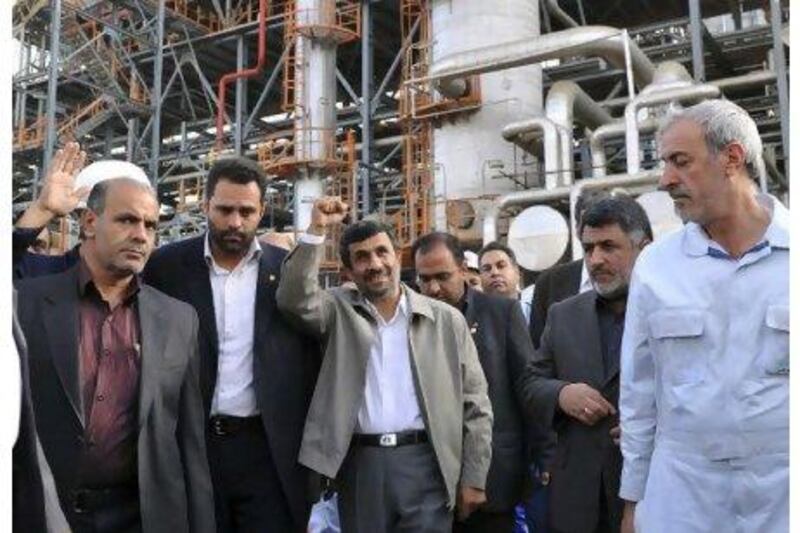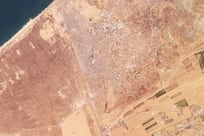An explosion at Iran's largest and oldest oil refinery killed at least four people and injured 25 during a visit by President Mahmoud Ahmadinejad to inaugurate an upgrade at the sprawling plant, reports from Tehran said yesterday.
The president was not hurt in what state media and officials said was an accidental blast, and he later appeared unruffled in a live broadcast on state television. He made no mention of the incident in a feisty speech that focused on lambasting the US president, Barack Obama, as a "pawn" who would fail to save the "Zionist regime".
State media swiftly blamed the explosion in the south-western city of Abadan on a gas leak or technical problems.
Lawmakers ruled out sabotage, but two parliamentarians accused Mr Ahmadinejad of rushing to open the refinery's new facility before vital pre-launch tests were completed in an attempt to pander to the Iranian electorate.
He was said to have insisted on pressing ahead in order to commemorate the anniversary of his first election as president in 2005.
The president is currently locked in highly public but seemingly doomed power struggle with Iran's supreme leader, Ayatollah Ali Khamenei.
Mr Ahmadinejad recently sacked his oil minister and proclaimed himself caretaker of the ministry, which is Iran's biggest source revenue. The country's constitutional watchdog, the Guardian Council, said he had no right to the post.
The Abadan blast was an acute embarrassment. It undermined Mr Ahmadinejad's questionable boast yesterday that Iran is now able to meet all its domestic oil needs, despite international sanctions that have hit its ability to import petrol.
"The enemy's hope to exert pressure on Iran by restricting [the import of] oil products has turned into complete desperation," he proclaimed.
Although Iran is Opec's second-largest oil exporter, the Islamic republic lacks domestic refinery capacity and most foreign experts dismiss Tehran's claims that it is now close to self-sufficiency.
Any damage to the century-old plant at Abadan, however, will have no impact on oil exports from the world's fifth biggest exporter because it is involved in producing gasoline.
There were conflicting reports in Iranian media about whether the blast, which set off a fire that was reportedly quickly extinguished, happened before, during or after Mr Ahmadinejad's visit to the Abadan refinery.
Industrial accidents are not uncommon in Iran's oil ministry. But its oil and gas infrastructure are often targets for sabotage and several rebel groups pursue bombing campaigns in various parts of the country.
Simultaneous explosions have damaged natural gas pipelines on two occasions this year, with authorities either giving no explanation or ruling out technical problems, implying foul play.
Last September, as many as 10 people were killed in a gas pipeline explosion near Iran's north-eastern city of Mashhad.
Abadan, close to the Iraqi border, is in the remote south-western province of Khuzestan, which is home to most of Iran's ethnic Arab minority. They have long complained that the area remains severely underdeveloped, despite being rich in natural gas and oil, and that there is a policy of official discrimination against them.
Human-rights groups say at least three people died and dozens were injured in Khuzestan province last month. Protesters were marking the anniversary of a "Bloody Friday" demonstration on April 15, 2005, when 20 Arab Iranians were killed by security forces.
The recent and largely unreported uprising by Iran's ethnic Arab minority, crushed by the authorities, was also inspired by the pro-democracy movements across the Middle East, analysts said.
Hamid Reza Katouzian, a lawmaker and member of parliament's energy committee, said he had warned about the risk of explosions because the Abadan refinery was not ready for an expansion.
Supporting his assertion that the incident was accidental, an Abadan resident told the Associated Press news agency that locals in recent days had noticed black smoke coming from the refinery, which he speculated could have come from a fire.
mtheodoulou@thenational.ae
Explosion at Iran oil refinery kills four during Ahmadinejad visit
Iranian president is unhurt in accidental blast as he opens upgraded facility aimed at helping country achieve self-sufficiency in petrol.

Editor's picks
More from the national




